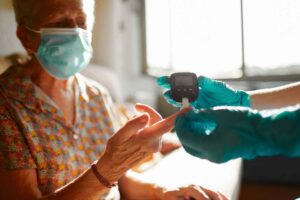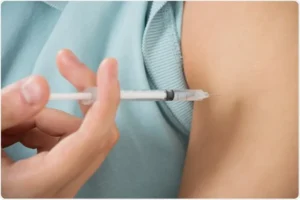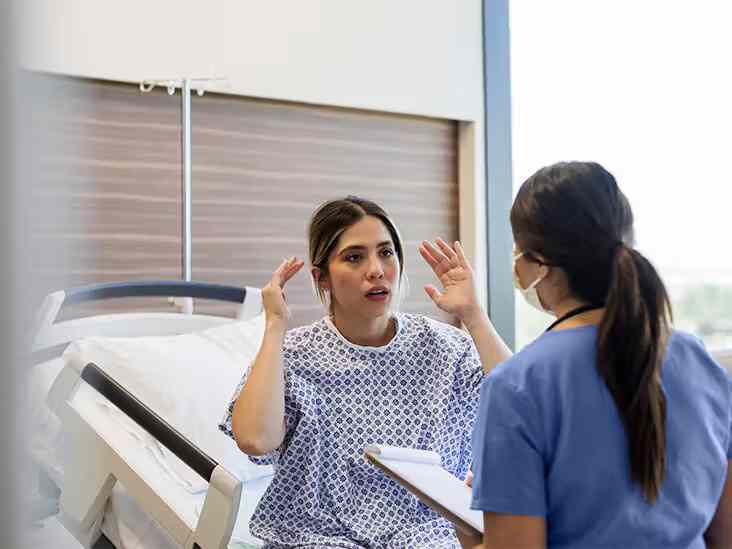Hyperglycemic shock, also known as diabetic ketoacidosis (DKA) when severe, is a critical condition that can occur in individuals with diabetes. It’s characterized by extremely high blood sugar levels, which can lead to serious, life-threatening complications if not treated promptly and effectively. This comprehensive guide aims to provide hyperglycemic shock treatment, prevent its occurrence, and support overall diabetes management.
Contents
What Are The Signs Of Hyperglycemic Shock?
 Hyperglycemic shock, often a result of extremely high blood sugar levels, can manifest through a variety of signs and symptoms that indicate the body’s inability to process glucose properly. Recognizing these signs early is crucial for effective management and prevention of severe complications. Here are the common signs of hyperglycemic shock:
Hyperglycemic shock, often a result of extremely high blood sugar levels, can manifest through a variety of signs and symptoms that indicate the body’s inability to process glucose properly. Recognizing these signs early is crucial for effective management and prevention of severe complications. Here are the common signs of hyperglycemic shock:
- Excessive Thirst and Urination: High blood sugar levels lead to increased urine production as the body tries to eliminate excess glucose, resulting in dehydration and a persistent feeling of thirst.
- High Blood Glucose Levels: Significantly elevated blood glucose readings are a direct indicator of hyperglycemia. Regular monitoring can help detect this early on.
- Ketones in the Urine: When the body starts breaking down fats instead of glucose for energy due to insulin deficiency, ketones are produced and can be detected in the urine.
- Nausea and Vomiting: As the body becomes more acidic due to the production of ketones, nausea and vomiting can occur, further complicating the state of dehydration.
- Fatigue and Weakness: High blood sugar levels can result in a lack of energy, leading to feelings of weakness and fatigue.
- Shortness of Breath: A rapid, deep breathing pattern known as Kussmaul breathing may develop as the body tries to correct the blood acid level by exhaling more carbon dioxide.
- Fruity-Smelling Breath: An unusual, fruity odor on the breath is a sign of high levels of ketones in the body, indicating severe hyperglycemia.
- Dry Skin and Mouth: Dehydration can lead to dry skin and a dry mouth feeling.
- A Rapid Heartbeat: Tachycardia or a rapid heartbeat can occur as the body tries to compensate for the decreased volume of circulating blood due to dehydration.
Recognizing these symptoms early and seeking immediate medical attention is vital in preventing the progression to more severe complications. Such as diabetic ketoacidosis (DKA) or hyperosmolar hyperglycemic state (HHS), both of which require urgent medical intervention.
What Is The First Aid Hyperglycemia Shock Treatment?
 First-aid hyperglycemic shock treatment (severe hyperglycemia) is critical and should be initiated as soon as symptoms are recognized while seeking professional medical help. Here are the initial steps to take in hyperglycemic shock:
First-aid hyperglycemic shock treatment (severe hyperglycemia) is critical and should be initiated as soon as symptoms are recognized while seeking professional medical help. Here are the initial steps to take in hyperglycemic shock:
Check Blood Sugar Levels
Use a blood glucose meter to measure the person’s blood sugar levels. A reading above 240 mg/dL (13.3 mmol/L) may indicate severe hyperglycemia, signaling the need for immediate action. Continuous monitoring can provide critical information on whether the person’s condition is improving or worsening.
Ensure the Person Stays Hydrated
Dehydration is a common and serious complication of hyperglycemia. Encourage the individual to slowly drink water or other calorie-free liquids to help dilute the high blood sugar levels and replace fluids lost through excessive urination. Aim for them to consume at least a glass of water every half hour.
Administer Insulin if Prescribed
If the person is conscious, coherent, and has been instructed by their healthcare provider on how to adjust their insulin dosage in cases of high blood sugar, help them to administer the insulin if needed. This should be done carefully, following their individualized diabetes management plan, to avoid the risk of hypoglycemia (low blood sugar).
Avoid Giving Sugary Foods or Drinks
Since the person’s blood sugar levels are already high, consuming sugary foods or beverages will only exacerbate the situation. Stick to water or non-caloric fluids.
Seek Emergency Medical Help
Call for emergency medical assistance without delay. Hyperglycemia can progress to life-threatening conditions if not treated promptly with medical interventions such as intravenous fluids and electrolytes, insulin therapy, and close monitoring.
Loosen Tight Clothing and Make Them Comfortable
Ensuring the person is as comfortable as possible is important. Loosen any tight clothing to help improve circulation and make sure they are in a safe, comfortable position, ideally seated or lying down in a well-ventilated area to help with breathing and prevent falls.
Never Attempt to Give Anything by Mouth if Unconscious
If the person is unconscious or unable to swallow, do not try to give them anything by mouth. This could lead to choking or aspiration. Instead, focus on keeping them safe and comfortable while waiting for emergency services.
Implementing these steps can significantly impact the person’s recovery and outcome. Remember, hyperglycemic shock is a serious condition that requires immediate medical attention.
What Medicine Lowers Blood Sugar Immediately?
To rapidly lower blood sugar levels, especially in emergencies like hyperglycemic crises (diabetic ketoacidosis or hyperosmolar hyperglycemic state), insulin therapy is the primary and most effective treatment. In emergency scenarios, insulin is usually administered intravenously (IV) by medical professionals to ensure quick action and to accurately control the dosage. This method allows for the rapid reduction of blood sugar levels under closely monitored conditions.
For chronic management of high blood sugar, other classes of medications can be prescribed. These include:
- Sulfonylureas: Stimulate the pancreas to release more insulin.
- Metformin: Reduces glucose production in the liver and improves insulin sensitivity.
- DPP-4 inhibitors: Help the body produce more insulin when needed and reduce the amount of glucose being produced by the liver.
- SGLT2 inhibitors: Prevent the kidneys from reabsorbing glucose, leading to its excretion in the urine.
- GLP-1 receptor agonists: Mimic an intestinal hormone that stimulates the release of insulin in response to food.
However, it’s important to note that apart from insulin, most oral diabetes medications do not lower blood sugar quickly enough to be considered for immediate treatment. Their role is primarily in the long-term management of blood sugar levels. Hence, always consult healthcare professionals for guidance on the appropriate use.
How To Prevent Hyperglycemic Shock?
 Preventing hyperglycemic shock involves diligent management of diabetes and understanding the factors that can lead to hyperglycemia. Here are strategies to prevent this:
Preventing hyperglycemic shock involves diligent management of diabetes and understanding the factors that can lead to hyperglycemia. Here are strategies to prevent this:
Regular Blood Sugar Monitoring
Consistently check your blood glucose levels to ensure they remain within your target range. This helps identify high blood sugar early and allows for timely adjustments to your treatment plan.
Understand Your Medications
Know how your medications work, when they peak, and their duration of action. Be aware of how to adjust your medication in response to changes in your blood sugar level. But always consult with your healthcare provider before making any changes.
Maintain a Healthy Diet
Eat balanced meals that are consistent in carbohydrate content to help regulate your blood sugar levels. Monitor your carbohydrate intake and avoid excessive consumption of sugary foods and drinks.
Regular Exercise
Exercise helps improve insulin sensitivity and can help manage blood sugar levels. Establish a regular exercise routine but monitor your blood sugar levels before, during, and after exercise to prevent hypoglycemia or hyperglycemia.
Stay Hydrated
Drink plenty of water throughout the day to help keep your blood sugar levels stable and facilitate the excretion of excess glucose through urine.
Manage Stress
Stress can significantly impact your blood sugar levels. Practice stress management techniques such as deep breathing, meditation, yoga, or exercise to help keep your blood sugar levels in check.
Monitor for Illness
Illness can cause your blood sugar to rise. Monitor your blood sugar more frequently during these times and know when to seek medical advice. You may need to adjust your medication or fluid intake according to your healthcare provider’s recommendations.
Education
Educate yourself about diabetes and hyperglycemic shock. Knowing the signs and symptoms of high blood sugar and understanding how to act quickly can prevent emergencies.
Have a Sick Day Plan
Have a plan in place for days when you are sick, as illness can affect your blood sugar levels. This might include more frequent monitoring, adjustments to your medication, and when to contact your healthcare provider.
Preventing hyperglycemic shock involves a comprehensive approach that includes lifestyle management, medication adherence, and regular monitoring of your health. Collaborate closely with your healthcare team to tailor a prevention plan that works best for you.
Conclusion
In summary, managing hyperglycemic shock treatment involves prompt recognition of symptoms, immediate first aid measures like checking blood sugar levels and staying hydrated, and seeking professional medical care. Insulin therapy is key for rapid intervention in severe cases. Preventing hyperglycemic shock requires diligent diabetes management, including regular monitoring of blood glucose, a healthy lifestyle, and adherence to prescribed medications.
By staying informed and prepared, individuals with diabetes can effectively manage their condition. Hence, minimizes the risk of experiencing hyperglycemic shock, leading to better health outcomes. Do you want to get rid of diabetes? Join our online diabetes treatment program and reverse Diabetes naturally through lifestyle changes such as a Personalized Diet plan, Exercise, Yoga, dieticians, and health coaches.

